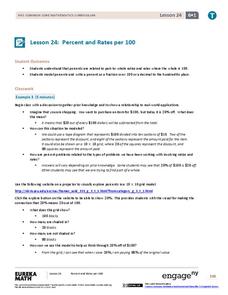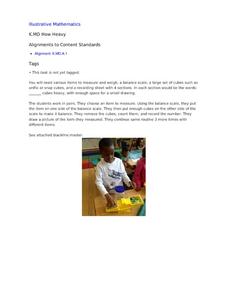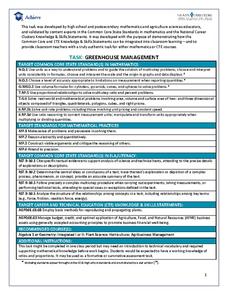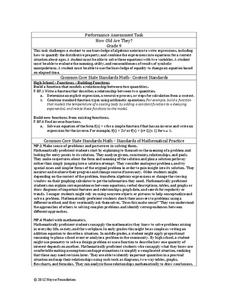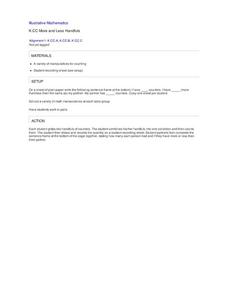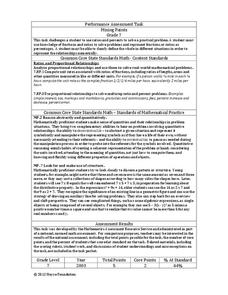EngageNY
Interpreting Division of a Fraction by a Whole Number—Visual Models
Divide fractions just like a model does. Pupils visualize the division of a fraction by a whole number by creating models. Scholars make the connection between dividing by a whole number and multiplication before practicing the skill...
Illustrative Mathematics
Many Ways to Do Addition
A great aspect of teaching math is that children have the freedom to solve problems using a variety of different strategies. The focus of this lesson plan is for young mathematicians to become aware of many ways of answering addition...
Illustrative Mathematics
Field Day Scarcity
Introduce young mathematicians to concepts of financial literacy with this open-ended word problem. With seven dollars to spend during field day and given a list of available items and their prices, children must determine how they want...
EngageNY
Creating Division Stories
Create your own adventure story ... well, not really. The fifth lesson in a 21-part series has pairs create story contexts for division problems. The lesson presents a step-by-step process for pupils to follow in writing such stories.
EngageNY
Percent and Rates per 100
What percentage of your class understands percents? Pupils learn the meaning of percents based upon rates per 100 in the 24th lesson in a series of 29. They represent percents as fractions, decimals, ratios, and models. The scholars...
Curated OER
How Heavy
Break out the balances for this primary grade lesson on weight measurement. Using common elementary school manipulatives like unifix or snap cubes, young mathematicians determine the weight of four different classroom objects. A graphic...
Illustrative Mathematics
How Long
It won't take young mathematicians long to learn how to measure length with this fun, hands-on activity. Working in pairs, children use Unifix® or snap cubes to measure and record the lengths of different classroom objects. To extend the...
Achieve
Yogurt Packaging
Food companies understand how to use math to their advantage. Learners explore the math related to the packaging and serving size of yogurt. They then use unit analysis and percent values to make decisions on the product development.
Achieve
Greenhouse Management
Who knew running a greenhouse required so much math? Amaze future mathematicians and farmers with the amount of unit conversions, ratio and proportional reasoning, and geometric applications involved by having them complete the...
Noyce Foundation
Granny’s Balloon Trip
Take flight with a fun activity focused on graphing data on a coordinate plane. As learners study the data for Granny's hot-air balloon trip, including the time of day and the distance of the balloon from the ground, they practice...
Illustrative Mathematics
Christina's Candies
Help Christina figure out how many chocolate and lemon candies she has with a lesson on decomposing numbers. When presenting this context to the class, the teacher chooses the total number of candies and the number that are chocolate,...
Balanced Assessment
Transformation I
Rewriting expressions in different forms is an essential algebra skill. Support the development of this skill by using a task that asks scholars to begin with a linear, quadratic, and rational expression and then manipulate...
Balanced Assessment
Transformation II
Develop a solid understanding of the manipulation of expressions to produce equivalent expressions. Given an expression, pupils rearrange it to create a new one. Their new functions must match the structure of the model expressions.
EngageNY
The Volume Formula of a Pyramid and Cone
Our teacher told us the formula had one-third, but why? Using manipulatives, classmates try to explain the volume formula for a pyramid. After constructing a cube with six congruent pyramids, pupils use scaling principles from...
EngageNY
An Application of Linear Equations
Just how far will the Facebook post go? Lead a discussion on how to manipulate the sum of a geometric series to figure out a formula to find the sum at any step. The plan contains an alternative to the discussion with more...
Inside Mathematics
How Old Are They?
Here is a (great) lesson on using parentheses! The task requires the expression of ages using algebraic expressions, including the distributive property. Pupils use their expressions to determine the individual ages.
EduGAINs
Introduction to Solving Linear Systems
Word problems offer class members an opportunity to learn the concept of solving linear systems using graphs. Individuals choose a problem based upon preferences, break into groups to discuss solution methods and whether there...
Curated OER
More and Less Handfuls
Working as a pair, two kindergartners will sit at a table and will pick two handfuls of counters. They will combine their individual handfuls into one, and count their own selection. They will then draw and record their count on a record...
California Education Partners
Colorful Data
Scale up your lessons with a performance task. Young data analysts work through an assessment task on scaled bar graphs. They answer questions about a given scaled bar graph on favorite colors, analyze a bar graph to see if it matches...
California Education Partners
Fun on the Farm
Let imaginations run wild as participants design animal pens. A performance task challenges young mathematicians to determine the perimeter or a missing side length of different animal pens. They then design pens that meet given...
California Education Partners
Tile Mural
Paste this resource into your lesson plans like you'd paste a tile onto a mural. Given a diagram of a tile mural with rectilinear figures, future artists determine the perimeters and areas of the figures. They must then develop their own...
EngageNY
Three-Dimensional Space
How do 2-D properties relate in 3-D? Lead the class in a discussion on how to draw and see relationships of lines and planes in three dimensions. The ability to see these relationships is critical to the further study of volume and...
Noyce Foundation
Mixing Paints
Let's paint the town equal parts yellow and violet, or simply brown. Pupils calculate the amount of blue and red paint needed to make six quarts of brown paint. Individuals then explain how they determined the percentage of the brown...
Inside Mathematics
Marble Game
Pupils determine the theoretical probability of winning a game of marbles. Individuals compare the theoretical probability to experimental probability for the same game. They continue on to compare two different probability games.




